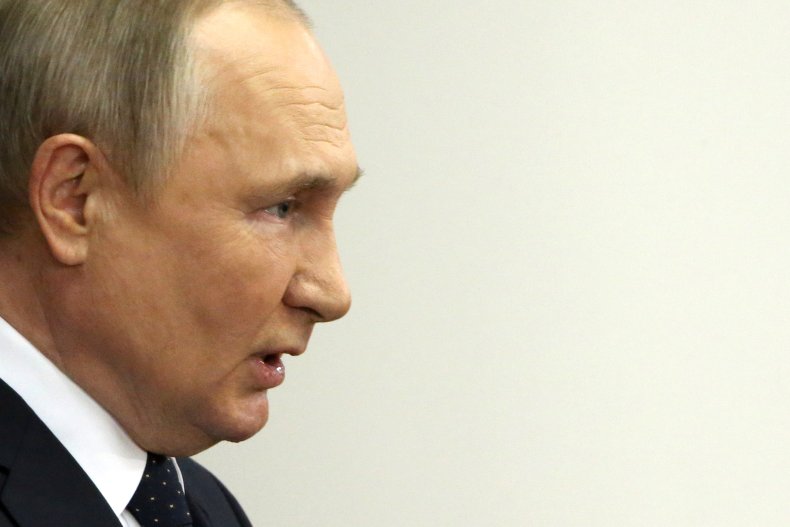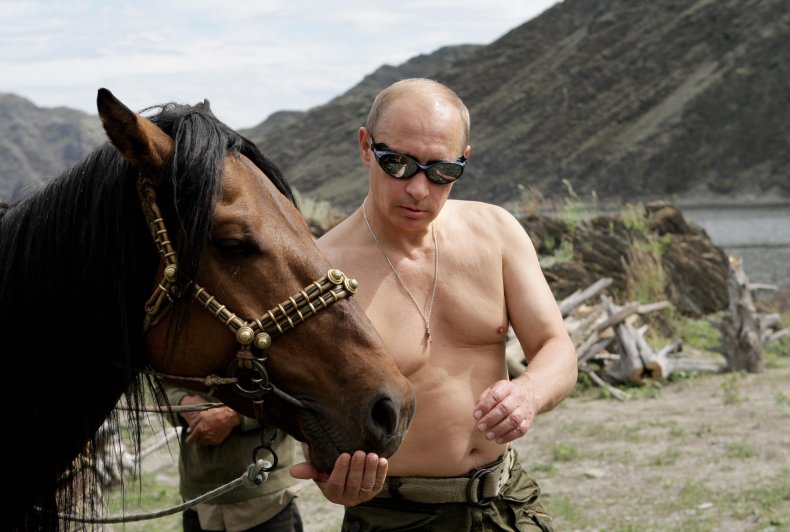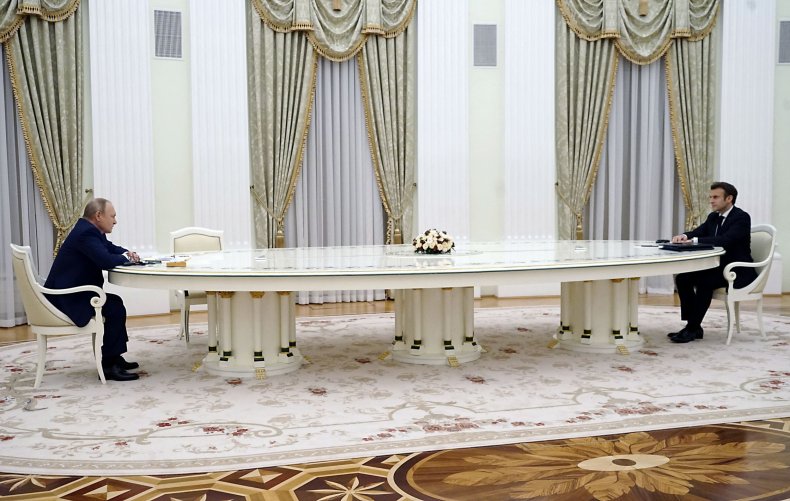Exclusive: Putin Treated for Cancer in April, U.S. Intelligence Report Says
By
William M. Arkin On 6/2/22 at 5:00 AM EDT
Vladimir Putin's health is a subject of intense conversation inside the Biden administration after the intelligence community produced its fourth comprehensive assessment at the end of May. The classified U.S. report says Putin seems to have re-emerged after undergoing treatment in April for advanced cancer, three U.S. intelligence leaders who have read the reports tell Newsweek.
Vladimir Putin was treated for cancer in April, says a classified U.S. intelligence report. The Russian president at the Tauride Palace on April 27, 2022, in Saint Petersburg, Russia. contributor/Getty Images
The assessments also confirm that there was an assassination attempt on Putin's life in March, the officials say.
The high-ranking officials, who represent three separate intelligence agencies, are concerned that Putin is increasingly paranoid about his hold on power, a status that makes for a rocky and unpredictable course in Ukraine. But it is one, they say, that also makes the prospects of nuclear war less likely.
"Putin's grip is strong but no longer absolute," says one of the senior intelligence officers with direct access to the reports. "The jockeying inside the Kremlin has never been more intense during his rule, everyone sensing that the end is near."
All three officials—one from the office of the Director of National Intelligence, one a retired Air Force senior officer, and one from the Defense Intelligence Agency—caution that the Russian leader's isolation makes it more difficult for U.S. intelligence to precisely assess Putin's status and health.
"What we know is that there is an iceberg out there, albeit one covered in fog," says the DNI leader, who communicated with
Newsweek via email and requested anonymity to discuss sensitive matters.
"One source of our best intelligence, which is contact with outsiders, largely dried up as a result of the Ukraine war," says the DIA senior official. "Putin has had few meetings with foreign leaders," the official says, cutting off the insights that can sometimes be gained in face-to-face encounters. "Putin's isolation has thus increased levels of speculation."
"We need to be mindful of the influence of wishful thinking," cautions the retired Air Force leader. "We learned—or didn't learn—that lesson the hard way with Osama bin Laden and Saddam Hussein."
Biden shouldn't plan on a Putin "expiration date," says U.S. intelligence official. The Russian Prime Minister with a horse during his vacation outside the town of Kyzyl in Southern Siberia on August 3, 2009. ALEXEY DRUZHININ/AFP via Getty Images
A picture of manhood
Horseback-riding, hockey-playing
Vladimir Putin has been the image of masculinity and vitality for years, a persona carefully curated by official Moscow and one often used by Kremlin propagandists to contrast the Russian leader with his American counterparts.
Then came the very long table that Putin used in the Kremlin to record the photo ops of his important meetings, one that came to symbolize his paranoia and physical fear.
The table most recently was the venue for Putin's meeting with French President
Emmanuel Macron on February 7, just two weeks before the Ukraine invasion. For the intelligence community, the long table and Putin's behavior with Macron became a baseline against which to measure the Russian president's decline.
"There was no shaking of hands, no warm embrace, and we noticed that," says the DNI leader. He said that French intelligence had many observations from the meeting and the trip to Moscow, declining to elaborate on what was reported back to the U.S. government.
Then came Putin's April 21 meeting with Russian Defense Minister Sergey Shoigu, this time at a small table, the hue all green and peaceful. Many focused on Shoigu, who had been missing from the public eye. But it was Putin who had largely been absent for much of the month, and he was far from a picture of health, slouching in his chair and
gripping the table with his right hand.
Some observers inferred that the Russian leader had Parkinson's disease. Others insisted it was just his
KGB weapons training, referring to his rigid stance and walk, always with the right arm ready to reach inside a jacket for a gun. The video was closely scrutinized by intelligence community analysts, some trained in remote diagnosis and others in psychiatry. Many pieces of intelligence were analyzed for the White House: the consensus was that Putin was ill and probably dying. He seemed to be putting on a good show. But perhaps the isolation of COVID had masked a decline that was only now more vividly being exposed.
The May 9 "Victory Day"
appearance was next, where a noticeably bloated Russian leader sat slumped. Putin's health, and his inability (or reluctance) to declare victory in Ukraine went together. The U.S. intelligence community agreed that his situation was graver than previously thought, and his physical exhaustion was matched by Russia's own exhaustion.
Three days later, Ukraine's head of intelligence Maj. Gen. Kyrylo Budanov told U.K. Sky News that Putin was in a "very bad psychological and physical condition and he is very sick," adding that there were plans inside the Kremlin to overthrow the Russian leader.
A rumor that Kremlin security people had uncovered a Russian plot to assassinate Putin was confirmed at this time. The CIA and foreign intelligence services were picking up consistent stories of discord at the top of the national security ministries, as well as the desire on the part of Russian diplomats to defect to the west.
"Someone once seen as omnipotent was now mostly seen as struggling with the future, his own in particular," says the DNI leader.
A long table between Vladimir Putin and French President Emmanuel Macron; Moscow on February 7, 2022. SPUTNIK/AFP via Getty Imagges
The Saddam and bin Laden effect
When serious intelligence started to circulate about Putin's illness, U.S. leaders were cautioned not to jump to conclusions too quickly, reminded of examples of hot "intelligence" about Osama bin Laden and Saddam Hussein that shaped U.S. policy and then proved questionable.
In Saddam's case, the question was whether he was psychologically disturbed and what he would do next with his weapons of mass destruction. In Osama bin Laden's case, before and after 9/11, it was whether he was dying, probably from kidney disease, and how that might influence his decisions.
Though U.S. intelligence knew little about the al Qaeda leader (and paid insufficient attention to what it did know before the World Trade Center and
Pentagon attacks), the state of his health was a constant part of reporting during the late 1990's. The most persistent rumor was that bin Laden was weak and fragile, requiring regular dialysis that was unlikely to be available in a cave. Pakistani President Pervez Musharraf affirmed that bin Laden was dying; other Pakistani officials—the source of much bin Laden intelligence—agreed.
Throughout those years the Saudi government was always ready with some gossip about their native son, tidbits that were always negative, questioning his achievements and his piety. A young Bin Laden whored and partied in Beirut and on the Riviera, the rumors said. Bin Laden didn't graduate from university, dropping out. Bin Laden didn't really go to Afghanistan after the Soviets invaded. Bin Laden didn't fight once he did go. The news media picked up all of these rumors, as did U.S. leaders, failing to take into account that the Pakistanis were reporting what they thought would dissuade the U.S. from focusing too much on bin Laden, while the Saudis thought that deprecating his honor and religious devotion would dissuade more young men from following the renegade son.
Lost in the wishful thinking was the key to bin Laden's power over his fiercely loyal disciples: his grievances with the West were their grievances, too.
"What Musharraf has to say carries more weight [with U.S. policymakers] than anything the CIA might say," the senior Air Force leader tells
Newsweek. "What the Saudis tell their American counterparts can be incredibly influential. Thus many wanted to believe that he was sick and couldn't believe that he was the charismatic leader that he was.
"Is Putin sick? Absolutely. But we shouldn't let waiting for his death drive proactive actions on our part. A power vacuum after Putin could be very dangerous for the world."
Saddam Hussein was considered one of the most dangerous men in the world, with CIA psychological assessments that portrayed him as a madman, a man who would never give up his WMD, a man so hated and vulnerable he had to sleep in a different bed every night. The evidence that Saddam did not have WMDs was ignored by Bush administration leaders who thought they knew better.
But the CIA wasn't solely to blame for the false belief that Iraq had weapons of mass destruction. High-level assessments offered by foreign leaders had an enormous impact.
"Hosni Mubarak [of Egypt], Abdullah [of Jordan], the Kuwaiti ruler himself—they all told Bush administration leaders that Iraq had weapons of mass destruction," says the retired Air Force leader. Where did the foreign leaders get their intelligence? From Saddam Hussein himself: it was an intentional deception on the part of the Iraqi leader to persuade the Bush administration not to invade and seek regime change, an implicit threat that he would use WMD if they did.
In some cases, experts now agree, some of that intelligence from foreign leaders, shared face-to-face with Bush counterparts, didn't circulate widely in the Agency. There was a clash between technical analysis that often doubted the existence of WMDs versus the Bush leadership's conviction that the U.S. intelligence community was a victim of group-think and that Saddam's public denials about WMDs were lies. (In fact it was his confidential whispers that were the lies.) That cognitive gap helped lead to war.
An expiration date?
The U.S. intelligence community's latest assessment for President Biden and other senior leaders saw a turnaround for the Russian leader after the previous report, compiled about two weeks earlier, portrayed him as gravely ill. On one day—May 26—he made his first public visit to a Moscow military hospital. He had a phone call with Italian Prime Minister Mario Draghi. And he spoke to a Russian business conference via video. Each appearance was closely scrutinized. This Monday, Putin had a phone call with Turkish President Recep Tayyip Erdogan where the two discussed the possibility of a face-to-face meeting with Ukrainian President Zelensky.
Russian Foreign Minister Sergei Lavrov dismissed any notion of Putin being sick in an interview on French TV last weekend. "I don't think that a sane person can suspect any signs of an illness or ailment in this man," Lavrov said, citing Putin's recent public appearances.
"Lavrov's insistence that everything is normal is as much a declaration of allegiance to Putin as it is any kind of diagnosis to be listened to," says the DIA official. The official says that Putin continues to be "challenged" both health-wise and in his leadership.
Are the lessons of bin Laden and Saddam being applied to Vladimir Putin? Is he fighting off Kremlin opponents and warring with his own intelligence agencies? Is he indeed dying? What—or who—comes next? These are the issues that the Biden administration is grappling with even as they publicly insist that rumors of Putin dying are just rumors.
"Even if they agree that the intelligence [that Putin is dying] is reliable," the senior DNI leader says, "they can't bank on an expiration date nor signal their support for a Russia without Putin." Both President Biden and Secretary of Defense
Lloyd Austin have let slip their desire not only for regime change but also the fall of Russia, and both have since walked back their indelicate statements.
"A nuclear-armed Russia is still a nuclear-armed Russia, whether Putin is strong or weak, in or out, and not wanting to provoke him or his potential successor into thinking we are hell bent on their destruction is an important part of continued strategic stability," says the DNI official.
The DIA leader argues that in some ways, "Putin being sick or dying is good for the world, not just because of the future of Russia or ending the Ukraine war, but in diminishing the mad man threat of nuclear war.
"A weakened Putin—an obviously declining leader, not one at the top of his game—has less influence over his advisors and subordinates, say, if he orders the use of nukes."
As the official explains it, a strong Putin could bully his way through, overcoming objections from ministers and commanders. But a damaged Putin (and here the official mentions
Donald Trump as a similar example), "one who might not be in control of all of his faculties, just doesn't have that kind of sway."
"Putin is definitely sick ... whether he's going to die soon is mere speculation," the DIA official says. "Still, we shouldn't rest assured. We shouldn't answer our own mail, if you will, believing only the intelligence that affirms our own desired outcome. He's still dangerous, and chaos does lie ahead if he does die. We need to focus on that. Be ready."









